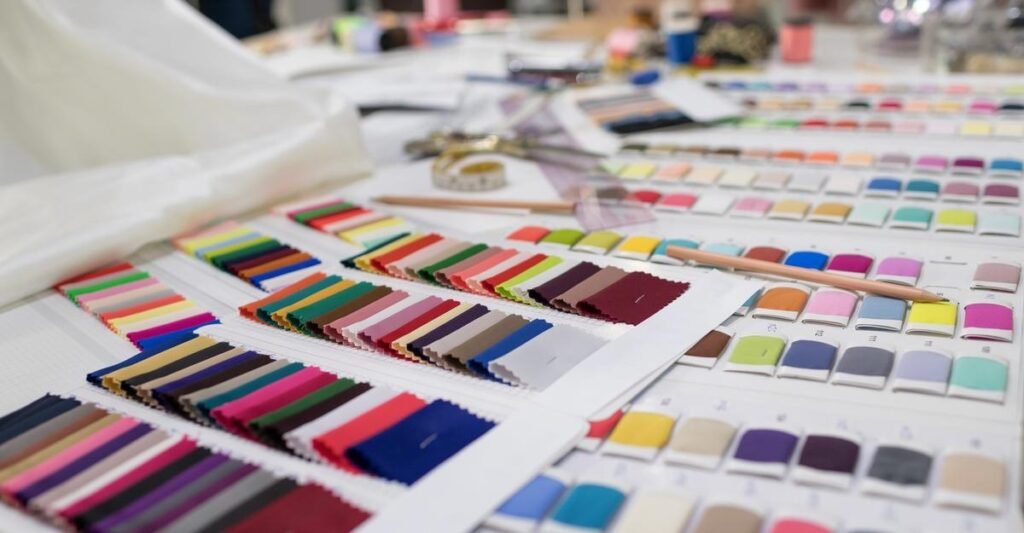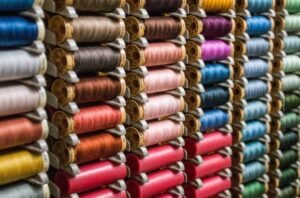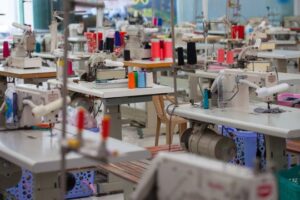
When you’re traversing the fabric landscape for your fashion business, choosing the right supplier can make all the difference in quality and sustainability. You might consider well-known options like Denver Fabrics or Mood Fabrics in the USA, or explore European suppliers who prioritize eco-friendly practices. But what about those innovative solutions coming from Asia? The decision isn’t just about variety; it’s also about reliability and alignment with your brand’s values. As you weigh these factors, think about how they could impact your production process and ultimately, your brand’s success. What criteria will guide your choice?
Top Fabric Suppliers in the USA
When diving into the fashion world, choosing the right fabric supplier can make all the difference in your projects.
Several key players stand out in the USA. Denver Fabrics offers a vast selection of high-quality materials ideal for various designs. Mood Fabrics, located in New York City and Los Angeles, is renowned for its trendy collections, ensuring you stay ahead in the fashion game. Fabric.com caters to enthusiasts with a diverse range of designer fabrics, while Fabric Wholesale Direct shines with competitive pricing for bulk orders.
Finally, Fabric Selection Inc. provides personalized service and industry expertise, making them a trusted partner.
Leading Fabric Suppliers in Europe
Choosing the right fabric supplier can greatly impact your fashion business, and while the USA boasts some fantastic options, Europe is home to leading suppliers that offer unique advantages.
European fabric suppliers stand out with their diverse product range, encompassing cotton, polyester, and luxurious blends, all crafted with an emphasis on quality. Many prioritizing sustainability, these suppliers are committed to eco-friendly practices, meeting the growing demand for responsible fashion. They often provide customization options, allowing you to create unique designs that resonate with your brand.
With extensive distribution networks across key textile hubs like Italy, Spain, and Germany, you can guarantee timely access to high-quality materials. Partnering with a European supplier can elevate your fashion line to meet discerning quality standards.

Notable Fabric Suppliers in Asia
Asia’s textile industry is a powerhouse, housing some of the most notable fabric suppliers in the world. If you’re looking for quality and variety, consider Shandong Ruyi Technology Group, a giant in fiber production, or Hengli Group, renowned for its polyester output. Wujiang Canhua stands out with its colored cotton and denim fabrics, meeting diverse design needs. In India, Arvind Mills leads the denim market, while Ashima Dyecot excels in cotton fabrics, contributing considerably to both local and global markets.
These suppliers not only offer exceptional products but also reflect Asia’s competitive edge in textile manufacturing. By partnering with them, you can leverage their expertise and resources to elevate your fashion business.
Essential Factors for Supplier Selection
Selecting the right fabric supplier can make or break your fashion business. You need to reflect on several vital factors to guarantee a successful partnership.
Start by evaluating their maximum and minimum order quantities and lead times—these will directly impact your production schedule. Next, assess their delivery methods and storage capabilities to ensure they align with your logistics needs. Supplier reliability is essential, so confirm their location’s stability and proximity to logistics hubs. Conduct thorough checks on their equipment and raw materials, making sure they meet industry standards.
Don’t overlook communication; assess their responsiveness and customer service, and confirm their certifications.

Advantages of Sustainable Fabric Options
Sustainable fabric options offer undeniable advantages that can elevate your fashion business while making a positive impact on the environment. By choosing materials like organic cotton and hemp, you’ll reduce water usage considerably, vital in water-scarce regions. These fabrics also lower pollution levels, as they’re free from harmful pesticides and synthetic fertilizers, contributing to a cleaner ecosystem.
Additionally, sustainable fabrics have a reduced carbon footprint, often relying on renewable energy during production. With options like Tencel and recycled polyester, you can embrace biodegradability and recyclability, ensuring your designs minimize waste. Adopting these eco-friendly materials not only aligns with consumer trends but also positions your brand as a leader in sustainable fashion, appealing to the conscientious shopper.
Conclusion
So, while you might think picking a fabric supplier is just about finding the prettiest cloth, there’s a whole world of reliability, sustainability, and communication lurking beneath the surface. It’s almost like choosing a partner—pick one who shares your values, or you might end up with a relationship that frays at the seams. Remember, a great fabric supplier doesn’t just provide material; they help weave the very fabric of your brand’s success.
